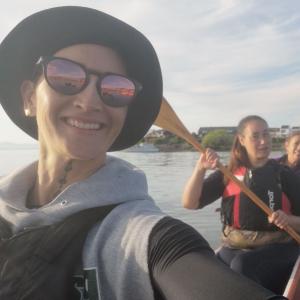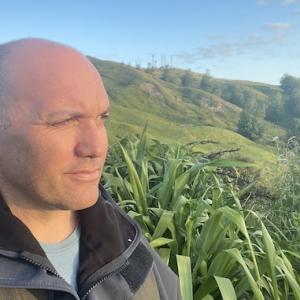Hinemoa Watene (Ngāti Whātua, Ngāpuhi, Rongowhakaata, Ngāti Porou, Whakatōhea) is a researcher at the University of Otago who once had a promising future playing rugby. Her experiences on and off the field inspired her to pursue research on how rugby can improve its treatment of women, and especially Māori women.
Growing up, Hinemoa loved throwing a rugby ball around with her brother and was able to express her sporting prowess with increasing success as she grew into her teenage years.
She started playing against other girls at Howick College in the seven-a-side game, and this led to her playing 15-aside for College Rifles in Auckland as well as the Auckland Storm in the Farah Palmer Cup (FPC). Eventually, she played for the University of Otago 15-aside squad when she moved to Dunedin to study for a Bachelor of Sports Development Management and Psychology.
Hinemoa represented New Zealand at the Youth Olympic Games in the rugby sevens team at age 18, and was playing for the Otago Spirit Women’s representative team by the age of 19. However, by 21 Hinemoa had hung up her boots, disheartened with the way wāhine Māori were being treated.
The reasons why she left rugby became the focus of her research, beginning when Hinemoa was accepted into the NPM 2022/23 New Horizons Summer Intern Programme. Last year Hinemoa published a literature review from her internship. The review identified three themes: the ongoing challenges that Māori face in rugby; the expression of Māori identity and cultural practices; and promotion of diversity and inclusion. Hinemoa is now using the literature review as part of her Master’s thesis. “I wanted to understand why our rugby system is this way and find what academic literature is saying about rugby for wāhine Māori and for tāne Māori as well as for women in general playing rugby.” Hinemoa says her research provided a wider context for the challenges she experienced as a player. One related to the free cultural labour that Māori players were expected to provide as part of building “team culture”.
She says while she was playing for Otago, Māori players were targeted for their “Māoriness” and the responsibility was placed on them to create team culture. “If they couldn’t or didn’t want to have that expectation placed upon them, their mana and Māori identities were questioned by the coaching staff,” says Hinemoa.
“Māori was used to the benefit of the team when it suited them. They were only interested in using Māori culture to make themselves look the part but were not actually supportive of Māori wāhine and meeting their cultural needs,” she says.
Other examples of her time in rugby aligning with her research conclusions was the inappropriate language and body contact she experienced by coaches. “Coaches would touch our bodies, heads included, without permission, they would swear and hurl abuse at players and think this was appropriate,” she says. “This isn’t the way I was brought up and it was the same for other wāhine.”
There were also obvious gender inequities in terms of access to facilities and support. “When I was playing we were given the worst gym times, expecting to go in at the crack of dawn, while male players were given much more favourable treatment, and access to facilities and resources,” says Hinemoa. Hinemoa says a group of Māori and Pasifika team mates in the Otago Spirit were so frustrated that they decided to leave mid-season in 2021. She supports ex-Black Ferns player, Te Kura Ngata-Aengamate’s taking aim at the Black Fern’s coach after the team’s ill-fated tour to Europe in 2021 because she believes it reflects what other Māori women were experiencing in other teams.
Hinemoa says what she found in her research confirmed why she felt she had to give up rugby. “I found it is not just a Hinemoa problem, it is not just a Te Kura Ngata problem. The review confirmed that the way women are treated, and in particular Māori women, is a systemic problem in rugby.
Her research suggests racism within rugby has been a long-running issue for both male and female Māori players and racial stacking is another example of how this plays out. “The racial stacking of bodies and stereotypes are harmful. Beliefs such as Māori don’t have game awareness and are only used for strength and speed is common. Coaches and management need to see that Māori players are the full package,” says Hinemoa.
Prior to the literature review, Hinemoa wasn’t aware of how much tāne Māori had done for progressing the game forward. “They didn’t have it easy. They definitely paved the way for us wāhine, but we also have different experiences of māmae due to gender inequities on top of racism.”
Hinemoa believes rugby is an amazing game to be part of and she wants to see change so that people will stay in the game for longer, not just as players but in governance positions too. “While rugby has a way to go in making changes to allow wāhine and tāne Māori in being themselves unapologetically, it is making strides as you can see with the Black Ferns, Super Rugby Aupiki and Farah Palmer Cup. This needs to filter down to all levels because rugby itself has so much potential in doing good for our people and bringing us together as Māori."
He Kōrero | Our Stories
Neuroscientist Nicole Edwards is establishing her own lab at the University of Auckland and is eager to tautoko students interested in a career in brain research.
AUT senior lecturer Deborah Heke encourages wāhine Māori to cherish their connection with te taiao.
Tairāwhiti local Manu Caddie is a vocal critic of forestry companies engaged in unsustainable land practices in the rohe. He shares his insights on what needs to change".


